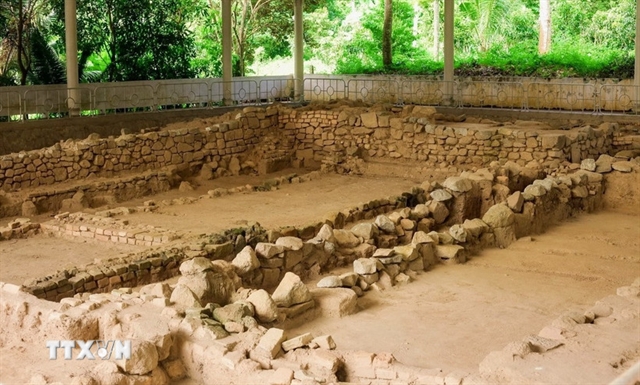 Life & Style
Life & Style


|
| The excavation pit at the Gò Cây Thị site inside the Óc Eo-Ba Thê archaeological complex. — VNA/VNS Photo |
HÀ NỘI — Authorities have issued a document on nominating the Óc Eo-Ba Thê Archaeological Site in An Giang Province for recognition by UNESCO as a World Cultural Heritage site.
The Government Office issued the document, which conveys the opinion of Deputy Prime Minister Mai Văn Chính regarding the nomination dossier for the site to seek recognition from UNESCO.
According to the directive, the Ministry of Culture, Sports and Tourism will coordinate with the People's Committee of An Giang Province to review and ensure the quality and legality of the dossier.
The Minister of Culture, Sports and Tourism is authorised to sign the dossier on behalf of the Government for submission to the UNESCO World Heritage Centre.
The Ministry of Foreign Affairs and the Việt Nam National Commission for UNESCO will oversee foreign affairs procedures and promote Việt Nam's position within UNESCO's operational frameworks. These agencies are also responsible for international advocacy, building consensus to support the registration of the Óc Eo-Ba Thê Archaeological Site.
The Óc Eo-Ba Thê site encompasses a conservation area of over 433ha, which includes the Ba Thê mountainside area (143.9ha) and the Óc Eo field (289.3ha). This site is the centre of Óc Eo culture, an ancient society that flourished from the first to the seventh century AD, associated with the kingdom of Phù Nam and characterised by extensive historical ties throughout Southeast Asia.
The Óc Eo culture was identified by French scholar Louis Malleret in 1944 and is notable for its system of citadels, canals, tombs and thousands of artefacts made from gold, precious stones, ceramics and glass. These discoveries not only reflect the rich life of ancient southern inhabitants, but also demonstrate the cultural and commercial exchanges with various other civilisations in the region.
Recognising its significant value, Óc Eo-Ba Thê was designated as a Special National Monument in 2012. In 2021, the Prime Minister approved a plan for the preservation, restoration and rehabilitation of the relic complex.
In 2022, the UNESCO World Heritage Centre officially included Óc Eo-Ba Thê in the list of World Heritage sites to be considered for future recognition. VNS




